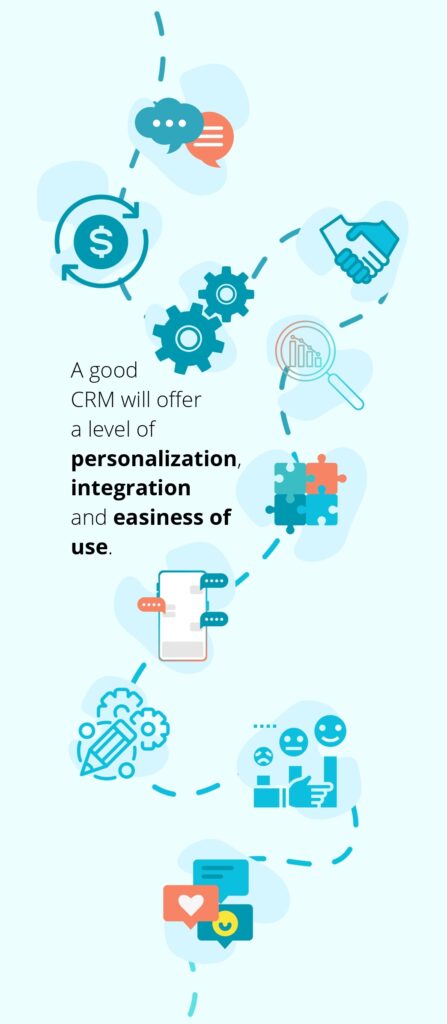CRM: All You Need to Know
CRM: All You Need to Know
What is a CRM?
In recent years softwares have become crucial in helping businesses achieve their goals, today we want to talk about one of the most important ones: CRMs. Its letters stand for Customer Relationship Management. It refers to a software system or strategy used by enterprises to manage their interactions with customers and potential clients. The main goal of a CRM system is to help companies improve their customer service, increase their overall satisfaction, and drive sales and revenue.
It typically includes a database of customer information, such as contact details, purchase history, and communication history. It can also include tools for managing sales leads, tracking customer interactions, managing information (such as form fills, calls, emails, text messages, and meetings, documents, quotes, purchases, tasks associated with each lead and client) and automating marketing campaigns.
By providing a view to customer data, the CRM helps businesses make better decisions and improve their communication and marketing efforts to the needs and preferences of their customers.
CRM top softwares
There are different CRM software options available on the market, each with their own strengths and features. This are some of the top CRM software options:
- Salesforce: A cloud-based CRM software that offers a wide range of features, including sales automation, marketing automation, customer service management and enterprise app development. It provides e-mail ticketing and toll-free phone.
- HubSpot: It is a cloud-based platform that provides a complete suite of tools for inbound marketing, sales, and customer service. It includes CRM features, and combines sales and marketing workflow.
- Zoho CRM: A cloud-based CRM software that incorporates sales automation, marketing automation, and customer service management tools. It is useful for lead generation through website scraping and deal management AI.
- Microsoft Dynamics 365: A cloud-based platform that includes CRM and enterprise resource planning (ERP) capabilities.
- Pipedrive: A cloud-based CRM software that is designed to help small and medium-sized businesses manage their sales pipelines more effectively.
Remember, every business is unique and the best CRM software will depend on its specific needs and the budget available.
CRM inside ERPs
It is becoming increasingly common for enterprise resource planning (ERP) software to include CRM functionality as part of its features. ERP systems help manage business functions and operations, while CRM systems help manage customer relationships. ERP systems are designed to manage and automate various business processes, including inventory management, accounting, and human resources.
The integration of a CRM functionality into an ERP system, can help centralize the business data and streamline the operations.
Some of the benefits of having CRM functionality within an ERP system include:
- Centralized Data: With both ERP and CRM functionality in the same system, businesses can access all relevant customer and sales data in one place, rather than having to switch between different applications.
- Streamlined Operations: Integrating CRM functionality into an ERP system can help streamline sales processes, automate workflows, and reduce duplication of efforts.
- Better Decision-Making: With access to real-time customer data, businesses can make more informed decisions about sales and marketing strategies.
- Improved Customer Service: With integrated CRM functionality, businesses can provide better customer service by having access to all relevant customer data in one place.
- Reduced IT and Training Overheads: With a single, unified platform for both ERP and CRM, there is no need of maintaining two separate systems resulting in reduced IT costs as only one training session would be required.
Some examples of ERP software that includes CRM functionality are SAP Business One, Microsoft Dynamics 365, and Oracle NetSuite.
What should I look for?
When evaluating a CRM system, there are several capabilities and features your company should consider to guarantee it meets the specific needs of your business.
Here are some of the key capabilities to look for in a CRM system:

- Contact Management: The ability to store, organize, and manage customer information and communication history.
- Sales Management: Capable of managing sales leads, tracking deals and opportunities, and monitoring sales team performance.
- Marketing Automation: Abled to automate marketing tasks such as email campaigns, social media marketing, and lead scoring.
- Customer Service Management: Manage customer inquiries and support requests, track customer interactions and resolutions, and monitor customer satisfaction.
- Reporting and Analytics: Qualified to generate reports and analytics on sales, marketing, and customer service performance to help inform business decisions.
- Third Party Integration: Efficient integration with other business systems such as ERP or marketing automation software.
- Mobile Access: The ability to access the CRM system from mobile devices such as smartphones and tablets.
- Customization: Customizable system to meet the specific needs of your business.
- User Interface and Ease of Use: The ease of use of the system and its user interface is important to ensure adoption and usability. Choose software that gives employees their own accounts where they can individually track their hours, tasks, meetings, sales numbers, goals and other items.
- Social Media: CRM with built-in social media monitoring features can save your marketing team time, because they won’t have to switch platforms to perform the essential task of monitoring your company’s social media.
By evaluating these capabilities and features, you can find a CRM system that meets the unique needs of your business and helps improve customer relationships, streamline sales processes, and drive revenue!
Are you confused by some terminology used within this blog? Take a look at our ERP Terminology Glossary

